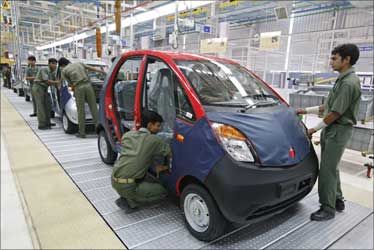 India's manufacturing sector activity remained broadly flat in June as new orders declined for the first time in over four years and power cuts and fragile economic conditions weighed on the sector's performance, an HSBC survey said on Monday.
India's manufacturing sector activity remained broadly flat in June as new orders declined for the first time in over four years and power cuts and fragile economic conditions weighed on the sector's performance, an HSBC survey said on Monday.
The HSBC/Markit purchasing managers index for the manufacturing industry stood at 50.3 in June, slightly higher than 50.1 in May. However, output witnessed a decline for the second consecutive month.
A reading above 50 shows that the sector is expanding, while a reading below 50 shows that the output in the sector is contracting. "Manufacturing activity was broadly flat in June. Output continued to contract due to power shortages, albeit less so than last month," HSBC Chief Economist for India and ASEAN Leif Eskesen said.
For the last two months, the index is barely managing to remain above the crucial 50 mark that divides growth from contraction, but has held above the mark for over four years now. The May PMI reading for the manufacturing sector was the lowest since March, 2009.
The survey further noted that economic conditions in India were fragile, resulting in lower demand. Moreover, there were also reports of increased competition for new work. During the month of June, the total new orders fell for the first time since March, 2009. Export business, however, rose at the sharpest rate since January as demand from key foreign clients strengthened.
"Despite the moderate pace of growth, output prices picked up slightly and input prices rose more notably, partly in response to the depreciation of Rupee," Eskesen said.
On the price front, input cost inflation accelerated to the sharpest since February. But, inflation was, however, "modest" as competition for new work persisted and weighed on pricing power, HSBC said.
The rupee last week sank to an all-time low of 60.72 against dollar on heavy capital outflows and month-end dollar demand from importers.
Meanwhile, June witnessed the fastest rise in employment since March. Manufacturers added to their workforce numbers in during the month considering the rising backlogs of work, HSBC said.






 © 2025
© 2025